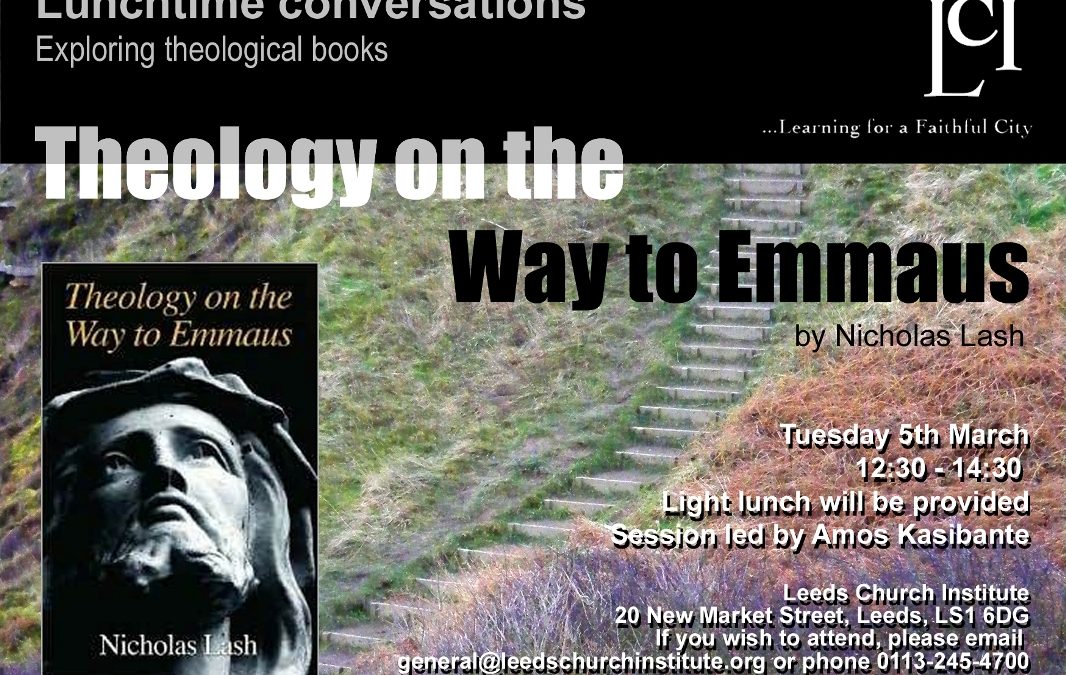“The story of the disciples on the way to Emmaus can serve as a parable for the task of Christian interpretation. Those disciples, like the rest of us, had some difficulty in ‘reading’ their history and the context of ‘recognition’, the occasion on which things began to make sense, was not some ‘religious’ event in a sacred space, but an act of human hospitality.” Nicholas Lash
 Theology on the Way to Emmaus by Nicholas Lash is the topic for the March Lunchtime Conversation. The session will be led by Amos Kasibante. Lunchtime Conversations is a book club for theological books. Every six weeks a group of between 10 and 20 people from different theological backgrounds meet in LCI’s library to discuss a particular title over a bite to eat. Topics so far have ranged from how language is always contextual, to whether the church can be fully church without embracing those who are disabled by society. Each session is led by a member of the group. Anybody is welcome – you don’t have to have read the book being discussed, in fact after the session we hope that you might want to borrow it from the library!
Theology on the Way to Emmaus by Nicholas Lash is the topic for the March Lunchtime Conversation. The session will be led by Amos Kasibante. Lunchtime Conversations is a book club for theological books. Every six weeks a group of between 10 and 20 people from different theological backgrounds meet in LCI’s library to discuss a particular title over a bite to eat. Topics so far have ranged from how language is always contextual, to whether the church can be fully church without embracing those who are disabled by society. Each session is led by a member of the group. Anybody is welcome – you don’t have to have read the book being discussed, in fact after the session we hope that you might want to borrow it from the library!
Lunchtime Conversations are free, but please book by emailing [email protected] or phoning 0113 245 4700.
From Google Books:
“One of Professor Lash’s great gifts is that of asking awkward questions and not allowing solutions of theological problems to pass as accepted answers simply because they sound plausible and are passed on without rigorous examination. This collection of recent studies, some previously unpublished, is eloquent testimony to that gift, but without ever losing sight of the fact that theology is not only on the way, but on the way to the consummation of the experience of Easter. Of the book Professor Lash writes: The story of the disciples on the way to Emmaus can serve as a parable for the task of Christian interpretation. Those disciples, like the rest of us, had some difficulty in ‘reading’ their history and the context of ‘recognition’, the occasion on which things began to make sense, was not some ‘religious’ event in a sacred space, but an act of human hospitality. The first two essays treat problems which confront all current theology: the tension between the constructive and critical responsibilities of the theologian, and the relationship between the theological diversity and the unity of faith. There then follows a group of four essays dealing with aspects of the relationship between scripture, theology, and the problems of Christian living, that is to say, of ‘hermeneutics’ or ‘fundamental theology’. The next pair, which complement each other, are rather more philosophical or theoretical in character, and the final group considers more directly doctrinal questions concerning (respectively) religious experience and the doctrine of God, christology, resurrection, ecclesiology, and Christian hope.”

